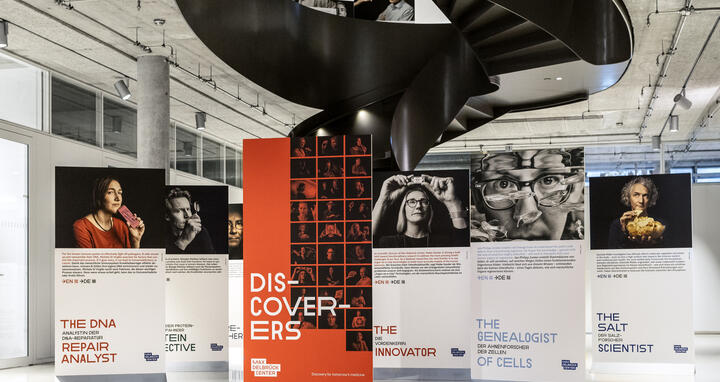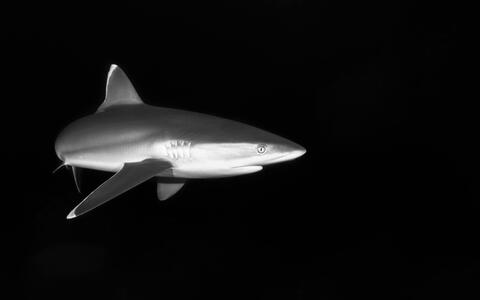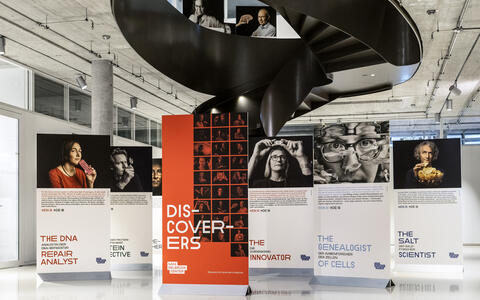Sharks, microbes and a world premiere
November 1, 2025, will mark the 10th anniversary of Berlin Science Week. This year’s theme is „Beyond Now” – how science can help break through the escalating urgencies of the present and open new perspectives for the future. As part of the festival, the Max Delbrück Center will be hosting several events. A few highlights can be found below.
Lecture and discussion: 50 years after “Jaws,” sharks, pain, ethics
Environmental journalist and hobby diver Luka Marie Weber has photographed great white sharks with broken jaws and clipped fins. The frequency of injured sharks has gone up alarmingly over the years.
The classic 1975 movie “Jaws” brought fear of great white sharks to our collective consciousness. But how much do we really know about these creatures? People still seem to believe that sharks feel no pain. During a presentation and subsequent panel discussion, scientists from the lab of Professor Gary Lewin will discuss how they are using bioinformatics, neural net based behavioral tracking and transcriptomics to study how sharks sense painful stimuli. Emerging evidence suggests sharks may, in fact, experience pain, raising urgent ethical questions.
When: Tuesday, November 4, 2025, 4:00 - 5:30 pm
Where: Berlin Institute of Medical Systems Biology of the Max Delbrück Center (MDC-BIMSB), Hannoversche Str. 28, 10115 Berlin
Language: English
Lecture and lab tour: One cell at a time, measuring the building blocks of our bodies
Did you ever wonder how our bodies develop from a single cell? This talk will begin with an introduction to single-cell technologies. Researchers will share insights into how organs and tissues form, how mutations can trigger disease, and how they can guide our immune system toward fighting cancer. Along the way, participants will see how machine learning and data science help scientists make sense of millions of measurements. After the talk, guided lab tours will give an up-close look at how these discoveries are made.
When: Tuesday November 4 and Thursday November 6, 2025, 6:00 - 7:30 pm
Where: Berlin Institute of Medical Systems Biology of the Max Delbrück Center (MDC-BIMSB), Hannoversche Str. 28, 10115 Berlin
Language: English
- Please register here (space is limited)
- Link to the event
Spark: Beauty is truth, truth beauty?
In this latest edition of “SPARK: creative processes in the arts and sciences,” guests are invited to explore the theme of beauty and truth with internationally acclaimed musicians and scientists: How does beauty relate to truth in science? Is beauty even a prerequisite for truth? The concert will feature the world premiere of jazz composer Wolfgang Köhler’s Cello Sonata, performed by Cicely Parnas and SooJin Anjou (SPARK co-director). The panel discussion will include: Professor Nikolaus Rajewsky, MDC-BIMSB Scientific Director & SPARK co-organizer; Dr. Stefanie Grosswendt, Research Group Leader at the Berlin Institute of Health and the Max Delbrück Center; Georg Braune, student at Charité – Universitätsmedizin Berlin
When: Wednesday November 5, 2025, 6:00 - 8:15 pm
Where: Berlin Institute of Medical Systems Biology of the Max Delbrück Center (MDC-BIMSB), Hannoversche Str. 28, 10115 Berlin
Language: English
Exhibition: “Discoverers”
Curiousness drives humanity – it has taken us to the depths of the ocean and all the way into outer space. When it comes to our bodies, who are the people most compelled to explore how they work? Our “Dicoverers” exhibition, which presents portraits of our scientists taken by photographer Pablo Castagnola, will return this year with new photographs
When: November 3, 2025 - November 10, 2005, Monday to Friday, 11:00 am - 6:00 pm
Where: Berlin Institute of Medical Systems Biology of the Max Delbrück Center (MDC-BIMSB), Hannoversche Str. 28, 10115 Berlin
Language: English and German
Microbes at the Natural History Museum
Did you know that our bodies contain more microbes than human cells? These microorganisms have existed for millions of years and have played a crucial role in shaping our environment and history. Join us at the Biopolis station at the Campus Exhibition, where we explore the fascinating world of microbe science through the podcast “Biopolis,” hosted by Theda Bartolomaeus and producer Michiel van Poelgeest. Bartolomaeus will also give a talk on the inspiration stage.
When: Booth on Saturday and Sunday, November 1 and 2, 2025, 9:30 am - 6:00 pm, Talk: November 1, 2025, 2:45-3:00 pm
Where: Museum für Naturkunde Berlin, Invalidenstr. 43
Language: English and German
European Animal Research Association conference (EARA)
The EARA Conference 2025 brings together leading voices in science communication, policy, and biomedical research to explore how transparency and public trust in animal research can be strengthened. The event features a two-day program of keynotes, panel sessions, and flash talks. The Max Delbrück Center is a co-organizer.
Where: Max Delbrück Center, Robert-Rössle-Str. 10
When: November 6 and 7, 2025, 8:30 am - 6:00 pm
Language: English
Registration: Tickets are required!
Further information
Contact
Jutta Kramm
Head of Communications
Max Delbrück Center
+49 30 9406-2140
jutta.kramm@mdc-berlin.de or presse@mdc-berlin.de
Photo for download
“Discoverers” at the Berlin Institute of Medical Systems Biology of the Max Delbrück Center. Photo: Pablo Castagnola, Max Delbrück Center
- Max Delbrück Center
-
The Max Delbrück Center for Molecular Medicine in the Helmholtz Association lays the foundation for the medicine of tomorrow through our discoveries of today. At locations in Berlin-Buch, Berlin-Mitte, Heidelberg, and Mannheim, interdisciplinary teams investigate the complexity of disease at the systems level – from molecules and cells to organs and entire organisms. Together with academic, clinical, and industry partners, and as part of global networks, we turn biological insights into innovations for early detection, personalized therapies, and disease prevention. Founded in 1992, the Max Delbrück Center is home to a vibrant, international research community of around 1,800 people from over 70 countries. We are 90 percent funded by the German federal government and 10 percent by the state of Berlin.







